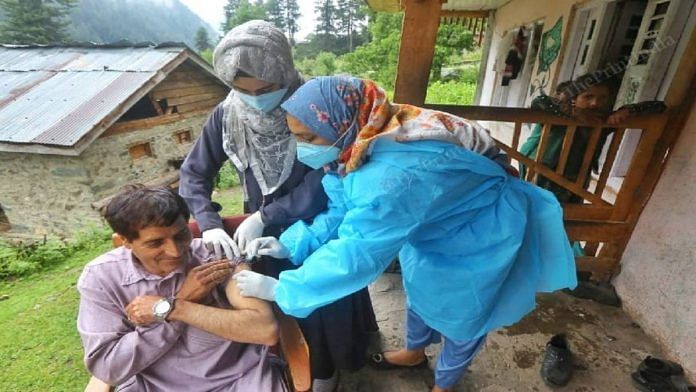Srinagar: Health workers across all districts in Jammu and Kashmir have so far been aiming to overcome vaccine hesitancy and fight misinformation with reference videos of doctors and enlisting religious leaders to talk about the positives of vaccination. That the government has inoculated army men too with the same vaccine, however, seems to be the winning argument.
“The Indian government has vaccinated all its defence personnel, including the Army with the vaccine. Will they ever inject their force with a medicine that will make them sterile or kill them…. Can any country afford to put its defence force at stake? If they have taken it, why can’t you?”
Logic has worked well in the state — health care workers in the valley have been deploying arguments like these to convince people that vaccination is not a “conspiracy by the Indian government” but a step that will save their lives.
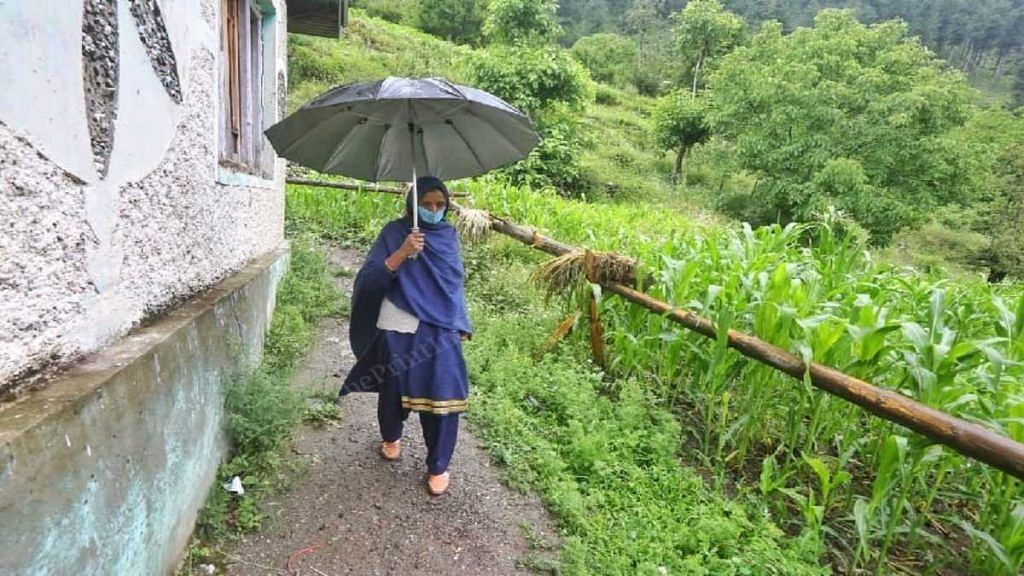
Despite vaccine hesitancy, terrain difficulties, misinformation and even attacks on health care workers by the public, Jammu and Kashmir has been able to successfully vaccinate 74 per cent of its population.
According to government statistics, by 15 July, 44,37,529 out of 91 lakh people 18 years and above, were given the first jab. The wastage is 1.08 percent. In the Kashmir valley, 22,79,566 have been given the first dose which amounts to 45.5 percent of the population.
Also read: ‘Will fight to get my wife back’ — Muslim man in Kashmir Sikh ‘conversion’ row won’t back down
How this battle was won
The reasons, for good vaccination coverage, despite the odds, are “dedicated teams”, inculcating a sense of competition between districts to “set targets and ensure maximum coverage”, “constant meetings to check deliverables by the Lieutenant Governor Manoj Sinha”, officials say.
“Here is a video of a gynecologist talking about how vaccines do not lead to infertility. Watch…” At some places, showing reference videos of gynecologists talking about how vaccines do not lead to infertility or male sterility was the best way to overcome resistance. Religious leaders including Maulvis and Imams were also persuaded to talk about the importance of vaccines at informal gatherings.
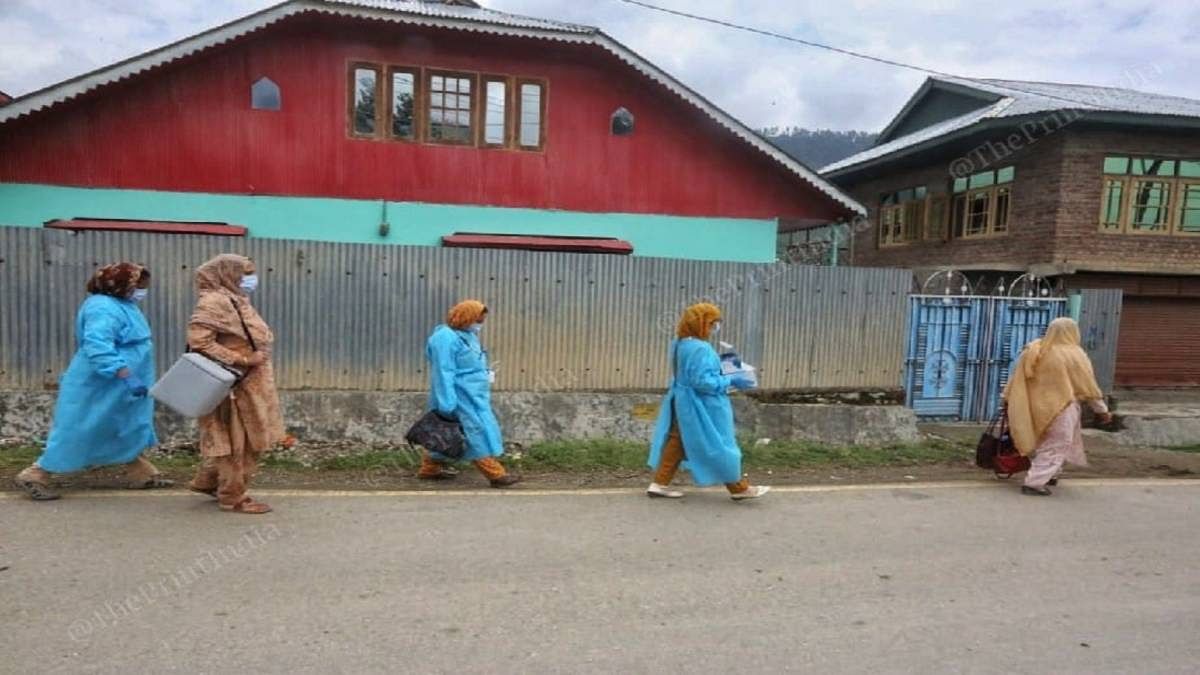
“Initially it was extremely difficult to carry out vaccination drives. Even the health care workers were hesitant, but the government decided that vaccination will be a key priority in the UT and worked towards it,” Director, National Health Mission, Mohammad Yasin Chaudhary said.
Health workers during an interaction with The Print discussed how this battle was won.
‘Trekked to remote locations, made videos to fight rumours’
Shamshada Akhtar, a health care worker is sitting inside a wooden hut turned into a sub center in Naranag, a remote village in Kashmir’s Ganderbal district, as it rains outside. But she has to gear up for a door-to-door vaccination drive to Mushkini, a small hamlet uphill, which is a three-hour-long trek.
Trekking to remote locations to vaccinate people in Kashmir has become routine for healthcare teams in the valley. Most times, the trek is treacherous and it takes days to reach the location. But the teams are determined.
“It is a difficult task but we have targets that we have to meet in a day, week and month. It is not just pressure from authorities, but because all of us feel that this is our responsibility,” Shamshada said.
More challenging than the trek up is facing a resistant crowd after climbing up, she adds.
For Ganderbal, which has a significant tribal population too, authorities said that roping in religious leaders and showing videos of doctors was the way to go. The videos were circulating through several WhatsApp groups.
“We had to battle myths and rumours. People believed that whoever takes the vaccine would die in two years. Many did not trust Indian vaccines and said they would wait for Moderna. People would even throw stones at us,” said Dr Nigadh Yasmin, Deputy Chief Medical Officer of the Ganderbal district where 100 per cent of its 45-plus population have been administered the first dose.
“The first people we vaccinated after convincing them were the village sarpanches, the Imams and Maulvis. Once they were brought on board, it became a little easy and people started listening to us. The doctors’ videos were also handy to convince people in remote areas,” Yasmin said.
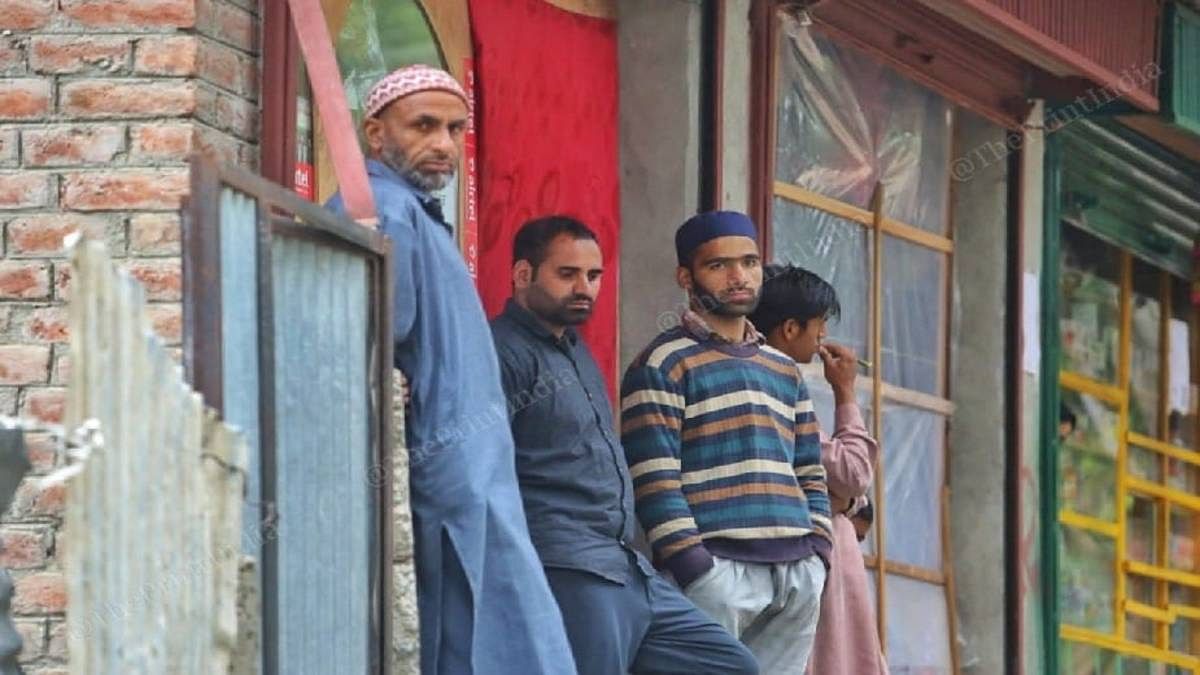
Competition between districts, regular monitoring
To vaccinate the maximum number of people “has now become a competitive exercise in Kashmir, which has further given pace to the exercise,” said health officials. This has helped to cover a lot of ground.
“Currently, this is the most important exercise. The LG has given clear instructions that this is priority and has also fixed accountability. Every day there are video conferences to discuss further strategy. Reports are taken from the districts – those performing well are appreciated, the ones doing poorly are asked to share their concerns and solutions are offered. There is daily scrutiny and monitoring,” a source in the administration said.
The general working population was also persuaded by holding the vaccination certificate as a mandatory document to be able to carry on their business. Transporters, vendors and drivers were told that they would not be allowed to carry on with their work unless they had a vaccination certificate.
“I am a driver and I got the jab because at times the traffic policemen stop and ask me to show my vaccine certificate. Now I have one, so I can carry on with my work,” Irshad Ahmad, a driver from Ganderbal said.
There were also complaints from some districts that “people were being forced to take the jab”, which was then brought to the notice of the administration, sources said.
“There were a few isolated instances of some districts becoming over competitive and forcing people to take the vaccine, which is not how it should be done. People must be encouraged and convinced to take it. It should be voluntary. We took action and health workers in districts were asked not to force anyone,” the source said.
Regular monitoring of vaccination data is also helping the Valley track areas that are lagging. A centralised system which monitors number of doses being administered across districts, wastage and even reports of adverse reactions of vaccines, has been set up.
“If we continue at this pace and if the supply of vaccines is regular, we will be able to vaccinate everyone in the Valley above 45 years in the next one month,” Chaudhary said.
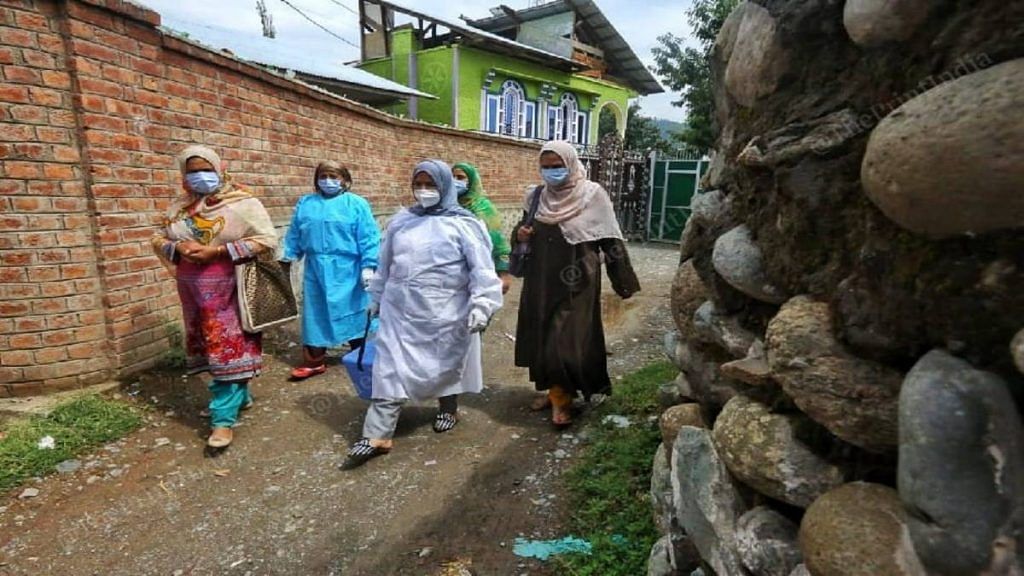
Vaccinating nomads still a challenge
What remains a challenge in Kashmir, is vaccinating the nomadic Bakarwals in areas that are close to the borders.
“They are still not willing to take a jab as they think that Covid-19 cannot reach that far,” a health official, who did not want to be named, said. “They also believe all the rumours. We are trying to engage with them and have put together special teams for this,” an official said.
Another challenge, the officer explained, is to get people their second dose.
“There is a big gap between the two doses and people tend to miss the second dose. As we have data, our people are keeping an eye on this. This entire exercise is about persuading people,” the official said.
(Edited by Paramita Ghosh)
Also read: Army commando who rescued Himachal tourists from dangling cable car now teaches Math in Australia


